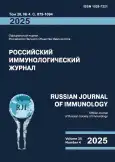JAK/STAT-сигналинг: новые перспективы в диагностике ожирения
- Авторы: Кулакова А.С.1,2
-
Учреждения:
- ФГБОУ ВО «Орловский государственный университет имени И.С. Тургенева»
- Медицинский центр «Мой доктор»
- Выпуск: Том 28, № 4 (2025)
- Страницы: 993-998
- Раздел: КРАТКИЕ СООБЩЕНИЯ
- URL: https://journals.rcsi.science/1028-7221/article/view/333261
- DOI: https://doi.org/10.46235/1028-7221-17089-JSS
- ID: 333261
Цитировать
Полный текст
Аннотация
Проблема ожирения во всем мире не имеет тенденций к разрешению на протяжении последних десятилетий. Доказано, что ожирение является одним из важных патогенетических факторов метаболических нарушений в организме, приводит к развитию различной патологии. Несмотря на многочисленные исследования, результаты которых уточняют аспекты патогенеза ожирения и связанных с ним изменений в метаболизме, остается много вопросов. Целью настоящего исследования являлось изучение компонентов сигнальной системы JAK/STAT – белков STAT1, STAT3, SOCS1, SOCS3, а также уровня цитокина IL-6 в сыворотке крови лиц, страдающих ожирением. Было обследовано 210 пациентов, распределенных на группы: I – лица с нормальной массой тела; II – пациенты с избыточной массой тела; III – пациенты с метаболически здоровым ожирением (МЗО), IV – пациенты с метаболически нездоровым ожирением (МНЗО). В работе был применен комплекс иммунологических и общеклинических методов исследования. По результатам исследования у пациентов, страдающих ожирением, выявлены достоверно значимые изменения значений компонентов JAK/STAT-сигнальной системы и уровня цитокина IL-6 в сыворотке крови. У пациентов с ожирением обнаружено повышение уровня цитокина IL-6 в сыворотке крови, а также статистически значимая корреляция IL-6 с показателями липидного профиля, белками STAT1, STAT3 и SOCS1, SOCS3. Уровни STAT1 и STAT3 были снижены у лиц с ожирением в отличие от лиц с нормальной и избыточной массой тела. Также наблюдался дисбаланс протеинов SOCS1 и SOCS3 у лиц с различными фенотипами ожирения. Установлены достоверно значимые корреляционные связи сывороточных уровней IL-6, STAT1, STAT3, SOCS1 и SOCS3 с показателями липидного обмена у пациентов с МЗО и МНЗО. Результаты проведенных исследований согласуются с имеющимися данными литературы об изменении экспрессии белков STAT1, STAT3 и SOCS1, SOCS3 у пациентов с ожирением, важном значении белков SOCS1, SOCS3 в осуществлении регуляции экспрессии STAT по принципу отрицательной обратной связи, участии цитокина IL-6 в активации сигнальной системы JAK/STAT и поддержании метавоспаления у лиц, страдающих ожирением. Таким образом, изучение показателей JAK/STAT-сигналинга может являться перспективным направлением в диагностике и поиске новых стратегий в борьбе с ожирением.
Ключевые слова
Полный текст
Открыть статью на сайте журналаОб авторах
Анастасия Сергеевна Кулакова
ФГБОУ ВО «Орловский государственный университет имени И.С. Тургенева»; Медицинский центр «Мой доктор»
Автор, ответственный за переписку.
Email: Kulakovaas@mail.ru
ORCID iD: 0000-0002-5828-8620
научный сотрудник лаборатории молекулярной, трансляционной и цифровой кардиоиммунологии ФГБОУ ВО «Орловский государственный университет имени И.С. Тургенева»; врач-гастроэнтеролог, терапевт, диетолог, Медицинский центр «Мой доктор»
Россия, г. Орел; г. БрянскСписок литературы
- Волкова Н.И., Ганенко Л.А., Поркшеян М.И. Метаболически здоровое ожирение, что мы о нем знаем? Медицинский вестник Юга России, 2017. Т. 8, № 3. С. 6-16. [Volkova N.I., Ganenko L.A., Porksheyan M.I. Metabolically healthy obesity, what do we know about it? Meditsinskiy vestnik Yuga Rossii = Medical Bulletin of the South of Russia, 2017, Vol. 8, no. 3, pp. 6-16. (In Russ.)]
- Кулакова А.С., Снимщикова И.А., Плотникова М.О. Особенности состояния STAT-сигнальной системы у пациентов с ожирением // Медицинский вестник Башкортостана, 2020. Т. 15, № 2. С. 22-25. [Kulakova A.S., Snimshchikova I.A., Plotnikova M.O. Features of the state of the STAT-signaling system in obese patients. Meditsinskiy vestnik Bashkortostana = Medical Bulletin of Bashkortostan, 2020, Vol. 15, no. 2, pp. 22-25. (In Russ.)]
- Abiri B., Hosseinpanah F., Banihashem S., Madinehzad S., Valizadeh M. Mental health and quality of life in different obesity phenotypes: a systematic review. Health Qual. Life Outcomes, 2022, Vol. 20, no. 1, 63. doi: 10.1186/s12955-022-01974-2.
- Grohmann M., Wiede F., Dodd G., Gurzov E.N., Ooi G.J., Butt T., Rasmiena A.A., Kaur S., Gulati T., Goh P.K., Treloar A.E., Archer S., Brown W.A., Muller M., Watt M.J., Ohara O., McLean C.A., Tiganis T. Obesity Drives STAT-1-Dependent NASH and STAT-3-Dependent HCC. Cell, 2018, Vol. 175, no. 5, pp. 1289-1306.e20.
- Lopez-Jimenez F., Almahmeed W., Bays H, Cuevas A., Di Angelantonio E., le Roux C.W., Sattar N., Sun M.C., Wittert G., Pinto F.J., Wilding J.P.H. Obesity and cardiovascular disease: mechanistic insights and management strategies. A joint position paper by the World Heart Federation and World Obesity Federation. Eur. J. Prev. Cardiol., 2022, Vol. 29, no. 17, pp. 2218-2237.
- Richard A., Stephens J. The role of JAK-STAT signaling in adipose tissue function. Biochim. Biophys. Acta, 2014, Vol. 1842, no. 3, pp. 431-439.
- Russo S., Kwiatkowski M., Govorukhina N., Bischoff R., Melgert B. Meta-Inflammation and Metabolic Reprogramming of Macrophages in Diabetes and Obesity: The Importance of Metabolites. Front. Immunol., 2021, Vol. 12, 746151. doi: 10.3389/fimmu.2021.746151.
- Wunderlich C., Hövelmeyer N., Wunderlich F. Mechanisms of chronic JAK-STAT3-SOCS3 signaling in obesity. JAKSTAT, 2013, Vol. 2, no. 2, e23878. doi: 10.4161/jkst.23878.
- Xu D., Yin C., Wang S., Xiao Y. JAK-STAT in lipid metabolism of adipocytes. JAKSTAT, 2013, Vol. 2, no. 4, e27203. doi: 10.4161/jkst.27203.
- Yang M., Tian M., Zhang X, Xu J., Yang B., Yu J., Li F., Li Y., Li S., Li X. Role of the JAK2/STAT3 signaling pathway in the pathogenesis of type 2 diabetes mellitus with macrovascular complications. Oncotarget, 2017, Vol. 8, no. 57 , pp. 96958-96969.
Дополнительные файлы







